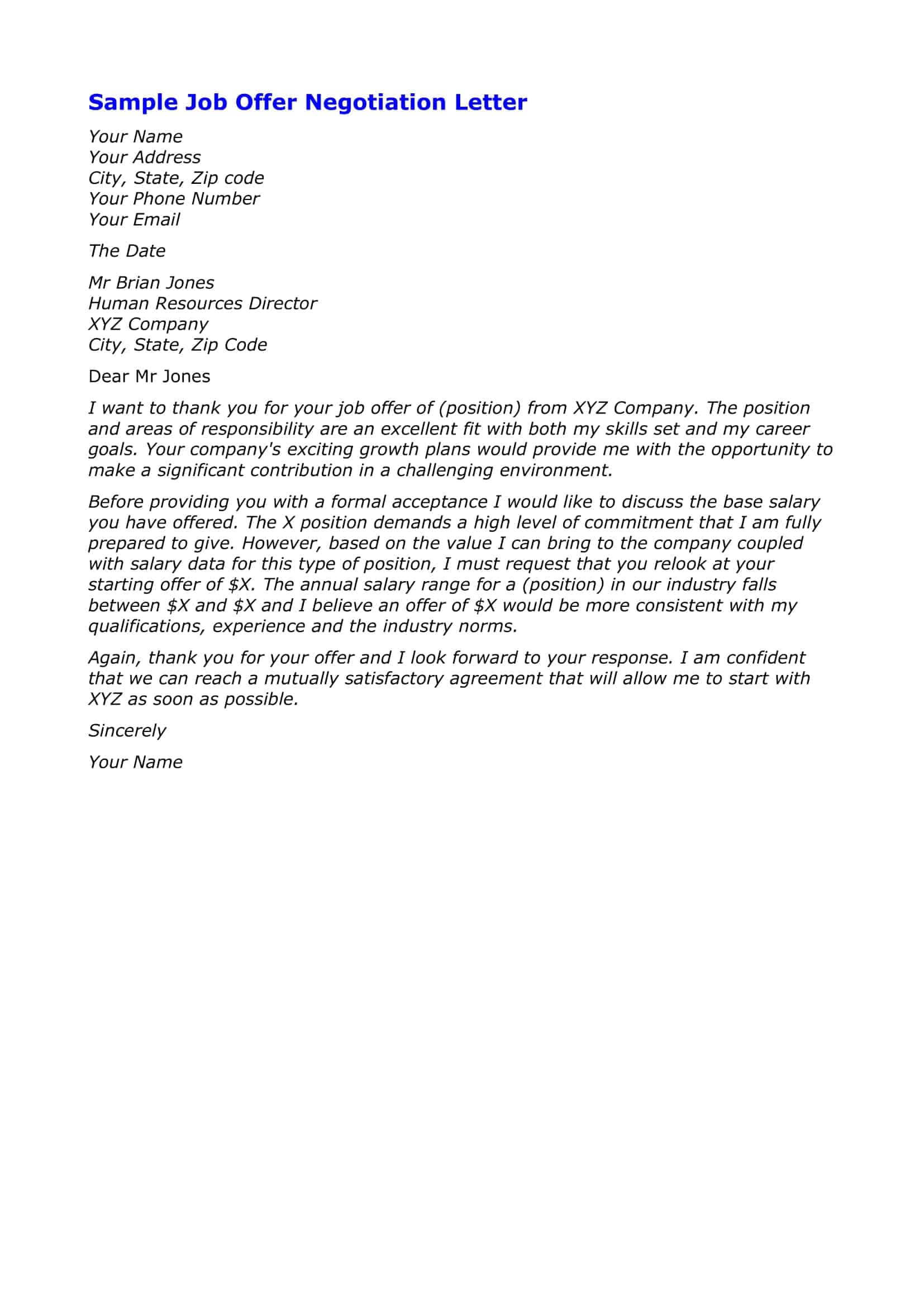Job Offer Negotiation: Strategies For 'Best And Final' Offers

Table of Contents
Understanding the "Best and Final" Offer
The phrase "best and final offer" often carries an air of finality, implying limited room for further negotiation. However, understanding the tactics employed and your own standing empowers you to navigate this critical stage effectively.
Recognizing the Tactics
Employers often use specific tactics when presenting a "best and final" offer. Recognizing these tactics is the first step in countering them:
- Creating Urgency: They may pressure you with a short deadline, suggesting the offer might be withdrawn.
- Implying Limited Flexibility: They may state explicitly that they cannot offer more, creating the perception of inflexibility.
- Highlighting Competitor Offers (if applicable): They might subtly suggest your offer is already generous compared to what others receive.
Evaluating Your BATNA (Best Alternative To a Negotiated Agreement)
Before engaging in any job offer negotiation, including responding to a "best and final" offer, solidify your BATNA. This is your backup plan—knowing your options gives you leverage:
- Alternative Job Offers: Do you have other offers on the table? This significantly strengthens your negotiating position.
- Continued Job Search: Are you actively pursuing other opportunities? This demonstrates you are not desperate.
- Financial Reserves: How long can you comfortably remain unemployed? This impacts your ability to hold out for a better offer.
Assessing the Offer Thoroughly
A job offer encompasses more than just base salary. Carefully analyze all components:
- Benefits Package: Health insurance, retirement plan contributions, paid time off (PTO), and other benefits significantly impact your total compensation.
- Bonuses: Consider any potential performance-based or signing bonuses.
- Stock Options: Evaluate the value and potential growth of any stock options offered.
- Vacation Time: Consider the amount of paid vacation time and any other paid leave offered.
- Relocation Assistance: If applicable, assess the value of relocation assistance provided.
Strategies for Effective Negotiation
Even when presented with a "best and final" offer, strategic negotiation is still possible. Remember to approach this stage professionally and prepared.
Prepare Your Counter-Offer
A well-reasoned counter-offer requires preparation:
- Research Salary Ranges: Use online resources and network to determine the appropriate salary range for your experience and skills in your location.
- Highlight Your Skills and Experience: Emphasize your unique skills and accomplishments that justify your requested compensation. Quantify your achievements whenever possible.
- Justify Your Requested Compensation: Clearly articulate why your requested salary aligns with your value and market standards.
Communicating Professionally
Maintain a positive and respectful tone throughout the negotiation:
- Active Listening: Carefully listen to the employer's perspective and address their concerns.
- Clear Communication: Be direct and concise in your communication, avoiding ambiguity.
- Expressing Gratitude: Show appreciation for the offer, even while negotiating.
Addressing Concerns and Objections
Anticipate potential objections and prepare responses:
- Addressing Budget Constraints: If budget constraints are cited, explore alternative compensation elements like increased vacation time or improved benefits.
- Justifying Your Value Proposition: Reiterate your value and contribution to the company, highlighting your unique skills and potential impact.
- Negotiating on Non-Salary Benefits: If salary is inflexible, negotiate on other benefits, such as a more generous retirement plan or professional development opportunities.
Knowing When to Walk Away
Knowing your limits is crucial. Sometimes, accepting a suboptimal offer isn't worth the long-term consequences.
Recognizing Deal Breakers
Clearly define your non-negotiable criteria:
- Unacceptable Salary: Determine the minimum salary you need to accept the position.
- Insufficient Benefits: Identify essential benefits that are critical to your overall compensation package.
- Lack of Professional Development Opportunities: Consider the opportunities for career advancement and skill development offered.
The Cost of Accepting a Suboptimal Offer
Accepting a less-than-ideal offer can have long-term implications:
- Career Progression: Limited salary growth may hinder your future career advancement.
- Job Satisfaction: A feeling of being underpaid can negatively impact job satisfaction and morale.
- Financial Stability: Insufficient compensation can impact your financial well-being and long-term security.
Graceful Exit Strategies
If the offer doesn't meet your needs, decline professionally:
- Expressing Appreciation: Thank the employer for their time and consideration.
- Maintaining Professional Relationships: Maintain a professional demeanor, leaving the door open for future opportunities.
Conclusion
Mastering the art of job offer negotiation, especially navigating those "best and final" offers, requires preparation, professional communication, and a clear understanding of your worth. By thoroughly researching salary ranges, crafting a well-reasoned counter-offer, and knowing when to walk away, you can confidently negotiate a compensation package that reflects your skills and experience. Remember to assess the entire offer, not just the base salary. Use these strategies to confidently negotiate the compensation you deserve! Mastering job offer negotiation, and specifically handling "best and final" offers effectively, is key to securing a rewarding career.

Featured Posts
-
 University Of Maryland Commencement Famous Amphibian To Deliver Speech
May 23, 2025
University Of Maryland Commencement Famous Amphibian To Deliver Speech
May 23, 2025 -
 Wwe Wrestle Mania 41 Golden Belts And Memorial Day Weekend Ticket Sales
May 23, 2025
Wwe Wrestle Mania 41 Golden Belts And Memorial Day Weekend Ticket Sales
May 23, 2025 -
 A Couples Unexpected Argument Involving Joe Jonas
May 23, 2025
A Couples Unexpected Argument Involving Joe Jonas
May 23, 2025 -
 The Israeli Embassy Attack Investigating The Role Of Elias Rodriguez
May 23, 2025
The Israeli Embassy Attack Investigating The Role Of Elias Rodriguez
May 23, 2025 -
 Vybz Kartel Dominates Brooklyn With Sold Out Shows
May 23, 2025
Vybz Kartel Dominates Brooklyn With Sold Out Shows
May 23, 2025
Latest Posts
-
 Review Jonathan Groffs Just In Time Captures The Spirit Of Bobby Darin
May 23, 2025
Review Jonathan Groffs Just In Time Captures The Spirit Of Bobby Darin
May 23, 2025 -
 Just In Time Musical Review Groffs Performance And The Shows Success
May 23, 2025
Just In Time Musical Review Groffs Performance And The Shows Success
May 23, 2025 -
 Jonathan Groffs Just In Time A 1960s Style Musical Triumph
May 23, 2025
Jonathan Groffs Just In Time A 1960s Style Musical Triumph
May 23, 2025 -
 Jonathan Groff And Asexuality An Instinct Magazine Interview
May 23, 2025
Jonathan Groff And Asexuality An Instinct Magazine Interview
May 23, 2025 -
 Jonathan Groffs Past An Open Conversation On Asexuality
May 23, 2025
Jonathan Groffs Past An Open Conversation On Asexuality
May 23, 2025
